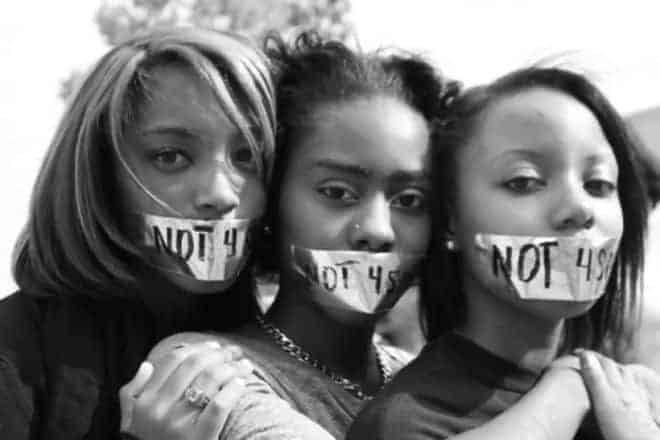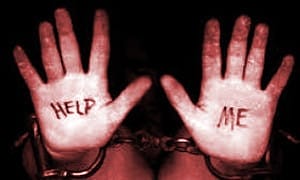
Human Trafficking is a global problem with serious implications for our state. Florida is ranked No. 3 in the nation in human trafficking, with most of the state’s statistics being generated in Orange County. As discussed in Part 1, the average age of the human trafficking victim in Florida is 10 – 12. In Part 2, we continue the discussion with a focus on the impact of human trafficking on the African-American community.
The biggest human trafficking issue in Central Florida is forced prostitution. In the City of Orlando, Orange Blossom Trail was for years known by local denizens as “the prostitute stroll.” People by and large assumed that these women were engaging in acts of prostitution as a matter of choice.
Some were. Many were not. But even “voluntary” prostitution is most often the by-product of some kind of medical or mental health issue that vitiates against the idea of true voluntariness.
Lately, the International Drive area has seen an increase in prostitution and related criminal activity. The huge supply of tourists makes the area attractive to human traffickers, who drag their victims out to have sex with men who come to Orlando for only a short while, and who are not concerned with whether the (minor) girls are willing participants or not.
While Sheriff Demings and Attorney General Pam Bondi have each embraced a zero tolerance policy for human trafficking, policies are unfortunately not enough. An effective collaboration with the public is required.
At a University of Central Florida event last year, a young trafficking survivor from a middle income family told of being lured away to a “job interview” where her trafficker abducted her then immediately forced her into prostitution. He “nearly beat her to death,” she said, to make her compliant. He then forced her to “dance” at clubs and private parties around the state for a year. She actually drove herself to many of her appointments– a fact many of us might find difficult to understand. But she never tried to escape or involve the police because the trafficker had threatened her daughter’s life.
“Freedom of movement,” she said, “did not mean freedom of choice.”
None of the people she interacted with knew she was someone’s slave. In the midst of a crowd of people, she believed she had no help.
For people who may be willing to help, awareness is the key.
A young woman living an otherwise ordinary life was kidnapped by a man pretending to be a member of the U.S. military– a man she thought she was dating. He took her on a date, then abducted her. He forced her into an abandoned house where he tied her up and repeatedly raped her as part of her “initiation” to prostitution.
After days of being held hostage she managed to escape and ran to a nearby suburban mall. Her kidnapper chased her there. She later recounted that when the trafficker, dressed in his nice military uniform, caught up with his dirty, smelly slave, the people around actually clapped as he dragged her out of the mall. Awareness is the key.
Although she later escaped again, if only one of the clappers had instead called the police, or asked if she needed help, her ordeal may very well have ended that day in the mall.
Impact on the black community
In the black community, human trafficking barely registers on the issues radar screen. Instead, imatters like reducing violence in black communities, education, mass incarceration, and employment– admittedly serious concerns– get most of the attention.
The African American Lectionary Project conducted a survey of 10,000 African American clergy of all denominations in 2006 and found at that time that the top three concerns facing the black community were: strengthening men and boys; strengthening families; and unemployment, poverty, and economic empowerment.
In a follow up survey conducted in 2013, the top-three issues of importance to African Americans–- as understood by those ministers–- were unemployment and poverty (particularly poverty among children), strengthening education for grades pre-k through 12, and strengthening families. Stopping the enslavement and sale of human beings is surprisingly absent from the African-American agenda– perhaps because it is not seen in its true light. This is not “someone else’s problem.”
According to the U.S. Department of Justice, Office of Victims of Crime, white females make up about 26 percent of trafficking victims, while 40 percent are black. This figure is alarming– because it’s three times higher than the percentage of African-Americans in the total population (roughly 13 percent according to the Census).
FBI statistics on the arrests of persons under the age of 18 are even more revealing. Black children make up a whopping 55% of all prostitution-related arrests in the U.S.
These girls and young women are daughters and sisters; someone’s nieces and cousins. Even when they are seemingly uncooperative, it is incumbent upon society to be mindful of how they have come to be so mentally reconditioned. Many don’t even see themselves as victims.
For some, the life of a prostitute seems preferable to the life they are running from– even though that frame of mind usually changes at some later point in time.
As one “pimp” put it:
“I would look for girls who needed sh—. who would do whatever to come out of the messed up homes and escape from their f—ed-up parents. I pulled these girls. Women who had been abused by some sucker and wanted better treatment and nice things.” (Source: “Human Trafficking: Black Girls Are Still Enslaved,” Annette Emery, LCSW; Laurie Cook Heffron, LMSW; and Detective Deek Moore, 2012)
It is inconceivable that black leaders could believe that prostitution is a consciously chosen profession among black females to such an extent.
Until black ministers begin to recognize the problem, and commit to raising awareness among their respective congregations, the devastation will continue. For the word among traffickers is that “having white slaves might pay better, but having black slaves will mean less jail time if you get caught.”
Human trafficking is right now impacting the black community in far greater proportion than any other ongoing event– the shootings of unarmed black men around the country included. The village must rise up and rally around its children. We need a comprehensive study of race and sex trafficking that conclusively explains why this disparity exists. Ten thousand black preachers from around the country could certainly help raise this flag.
Law enforcement officials throughout the state of Florida have already taken an aggressive stand opposing human trafficking. In 2013, law-enforcement officials (including Orange County Sheriff Jerry Demings), came together with child-welfare professionals and local nonprofit groups to form the Greater Orlando Human Trafficking Task Force, a group dedicated to eradicating human trafficking in the local area.
One of the biggest challenges faced by the task force, however, is the lack of safe (and secured) housing for rescued trafficking victims. Without it, victims have to be sheltered in juvenile detention facilities. Going back home is often not a viable option. Remember, the trafficker knows everything about his victim and returning home is merely an invitation to be taken again.
The other obvious and glaring weakness in the effort is the relative absence of the group so disproportionately impacted. Ramping up awareness of the problem in the black community and focusing attention on the fact that these children and young women are victims of an horrific crime are absolutely essential first steps.
“I think parents should be concerned a great deal about this,” said Alex Olivares, coordinator at the Florida Gulf Coast University Human Trafficking Resource Center, in a report by WinkNews.com earlier this year.
Especially here. And epecially now.
It’s a new day. Traffickers are using social media not only to advertise their victims’ availability, but to recruit them, as well.
“Everybody has a Facebook profile for example, a trafficker can go on there right now and learn some stuff about your life and use that to his advantage,” said Olivares.
They’re holding “job fairs” where they “hire” teens who report to “work” only to be abducted and forced into prostitution. Job posters offering jobs to teens were used by traffickers in southwest Florida earlier this year as part of one such scam.
Vigilance is absolutely necessary. If you are a parent with a teenaged girl looking for a job, you need to be aware of these scams. And don’t be so quick to dismiss the girls who are currently involved as unworthy of your time.
“There was a case out of northern Florida where the pimp had a 17-year-old girl working out on the street, and when she said she was going to leave, about half an hour later he sent her a picture of him with a gun to her mom’s head,” said Olivares.
So, she may actually be protecting mom or dad.
There are warning signs you can look for: tattoos of names on their neck or on the inside of their bottom lip, or sexually explicit social media profiles are strong indicators she has been forced into slavery.
If you suspect an adult is a victim of human trafficking (or if you yourself are a victim), please call the National Human Trafficking Resource Center at 1-888-3737-888. If you suspect a child is a victim of human trafficking, please call the Florida Abuse Hotline at 1-800-96-ABUSE.
For more information about human trafficking, or to learn how you can help, call the Greater Orlando Human Trafficking Task Force at 407.244.5129.



